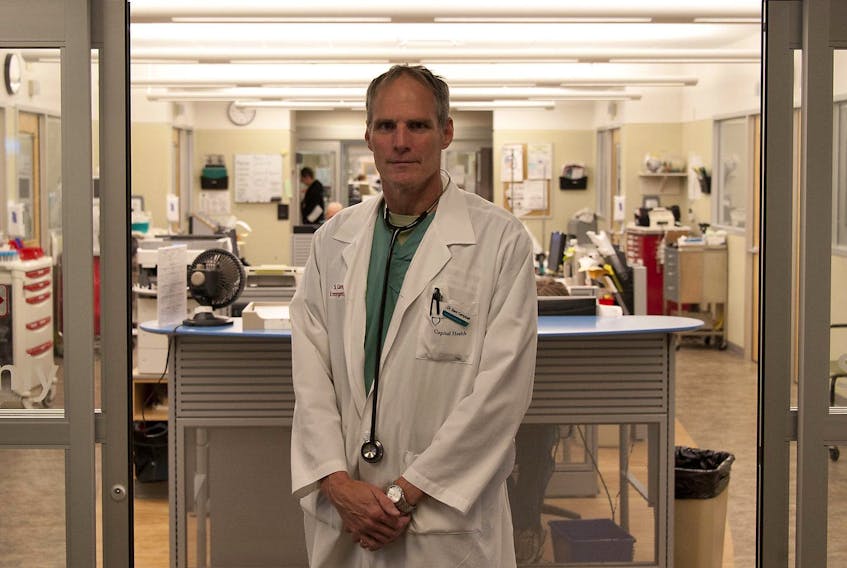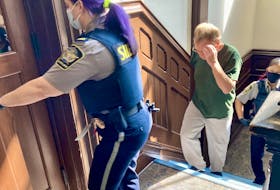On a recent evening, Dr. Sam Campbell examined at least five people in a crowded ambulance hallway at the Halifax Infirmary emergency department.
“I mean, there’s no way you can do a proper examination in an ambulance hallway,” said Campbell, the hospital’s chief of emergency medicine, in a recent interview. “We do it all the time because the alternative is leave the patient there and not help them.”
Campbell was responding to an op-ed piece recently submitted by Cape Breton emergency doctor Dr. Chris Milburn to The Chronicle Herald.
Milburn expressed deep frustration with the increasing number of medical assessments that emergency doctors are asked to do on people in the custody of police.
“The ED has always dealt with people involved in altercations, stabbings, domestic assaults, etc. This is not new,” he said in the opinion piece. “But the amount of ED resources being taken up by criminals has been on the rise. In the last decades, there has been increased scrutiny on police, and new rules dictate that they have criminals 'medically cleared' before locking them up. Anything bad that happens to a criminal now seems to be the fault of the police, and not the individual under arrest.
“Police policy here in Nova Scotia now mandates that any person under arrest about whom officers have any medical concern must be brought to emergency for ‘medical clearance.’ ”
Referring to the death of an inmate in a Halifax jail cell, and the subsequent conviction of two police officials, Milburn said doctors are taking on an unfair liability when it comes to assessing people in custody.
“One day, one of these criminals will have taken a drug, or drug combination, that will kick in later. He will have swallowed a baggie of cocaine that will later explode and cause an overwhelming overdose. One of these times, my luck will run out.
“No patients should be assessed in sub-optimal circumstances in a civilized country. We’re a civilized country with an odd medical system. No doctor should be doing assessments where they think, my resources are inadequate to do these assessments.”
- Dr. Sam Campbell, Halifax Infirmary emergency chief
“Then they will come for me. So I’m speaking out about this now.”
Milburn's op-ed has sparked strong reactions from readers, a defence lawyer and other doctors.
Campbell said emergency medicine is by definition a specialty where many decisions are made with inadequate information.
“So this happens often with someone who has intoxicated patients, things like that. But we make extremely risky, difficult decisions 20 times a shift.”
Numbers jump
Cape Breton Regional Police Service officers took 121 people from lockup to the Cape Breton Regional Hospital for medical assessment or treatment in 2018, a spokeswoman said. That number has jumped to 187 so far in 2019.
“CBRPS does have (a) policy for the care and handling of persons in custody, in accordance with the standards and regulations of the Nova Scotia Department of Justice,” Desiree Magnus said in an email. “Upon arrival at the lock-up facility, police officers are required to take note of any injury, illness or medical alert warnings prior to the prisoner being turned over to lock-up custodians and obtain medical assessment or attention if required.”
Prisoners brought into custody in a state of sleep or unconsciousness must be awakened before being placed in a cell, Magnus explained. “If the prisoner cannot be awakened, they must be immediately assessed by a physician.”
Lockup custodians are required to check on prisoners every 15 minutes, she added. “Should any prisoner complain of illness, injury or attempt suicide, medical aid must be requested.”
Under the Involuntary Psychiatric Treatment Act, which became law in 2007, officers can arrest a person with mental illness who presents a danger to themselves or others or if they are committing or about to commit a criminal offence.
“Officers are required to transport this person for medical examination and signed medical certificates for apprehension or release,” Magnus said.
Police officers praised
In his op-ed, Milburn said he's "constantly amazed by the grace, compassion, and patience" that officers show to people in custody.
"I have seen criminals spit at, assault and threaten officers and the officers’ families."
Const. John MacLeod, a spokesman for Halifax Regional Police, said its officers are often called upon to make an assessment of an individual’s medical health.
“The situations requiring these assessments vary widely and therefore the required actions are unique to each circumstance.”
As for the number of HRP visits to emergency departments and the specific policies that regulate them, MacLeod said that information was only available through an access to information request.
According to the Nova Scotia Health Authority’s most recent annual report, 585,026 people visited emergency departments in 2018-19.
Campbell said the overall volumes at the Halifax Infirmary emergency department have increased about 25 per cent over the past five years, so he figured police visits likely were also on the rise.
“We have a very, very good relationship with the Halifax police department. We’ve found them extremely sensitive to patients and I’d say more so than other places I’ve worked.”
But Campbell said the overall pressure on emergency medicine in Nova Scotia has reached a crisis point. He sympathizes with the frustrations of frontline doctors like Milburn.
“No patients should be assessed in sub-optimal circumstances in a civilized country. We’re a civilized country with an odd medical system. No doctor should be doing assessments where they think, my resources are inadequate to do these assessments.”
RELATED:
- DR. CHRIS MILBURN: 'Criminal element' sent to ER puts doctors in dicey spot
- DR. ARUNA DHARA & DR. LEAH GENGE: Patients need care, not condemnation
- CHRISTINE COOPER: Memo to Dr. Milburn — people in crisis no less worthy
- LETTERS: 'Criminal element' in ER — readers react to Sydney doctor
- MARYN MARSLAND & ALEX STRANG: Blaming patients unseemly — criminal behaviour often a byproduct of social ills
- STEVE BARTLETT: ER doctor's commentary reaches hundreds of thousands









